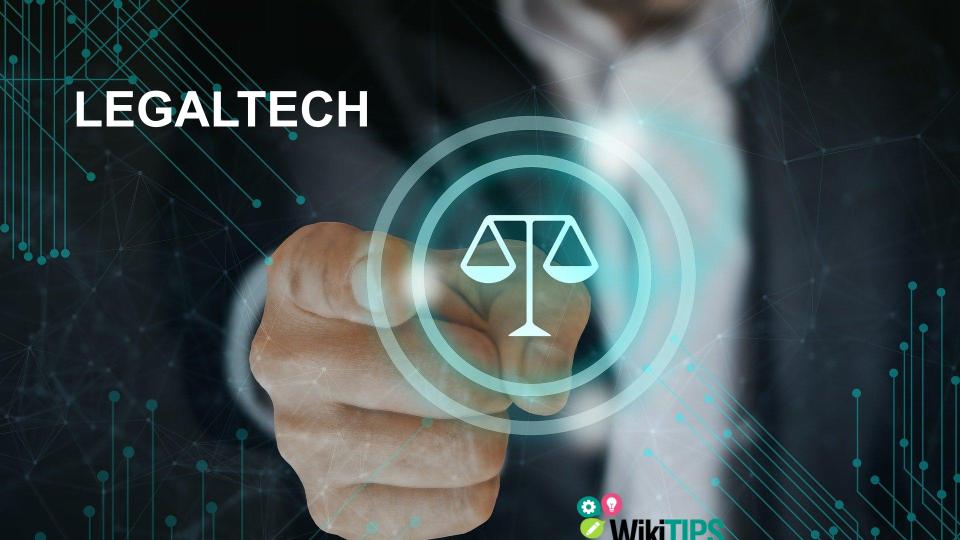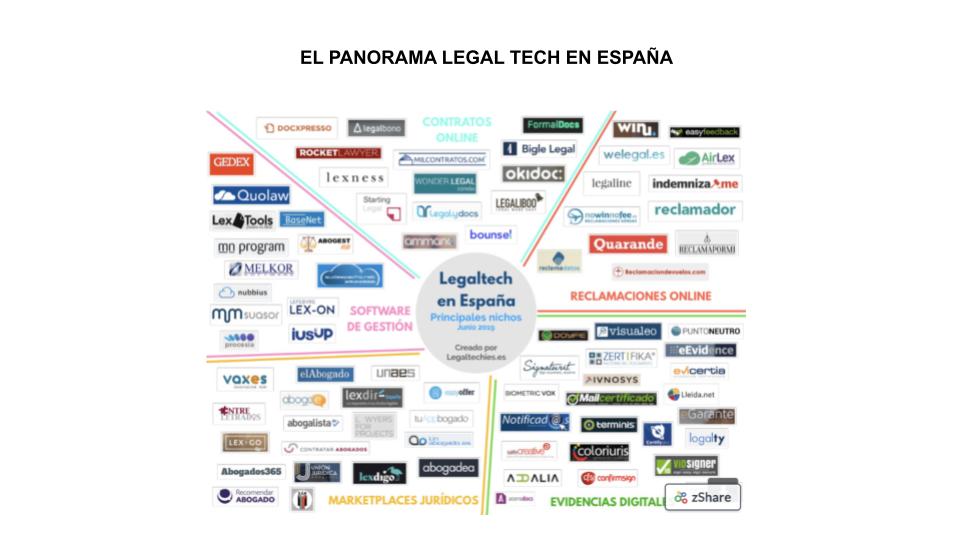
LEGALTECH
Accelerate your business with these expert tips about "Legaltech". Analyse and discover this TIP!
Technologies applied to the legal sector are known as "Legaltech", an anglicism that combines the terms technology and legal disciplines and is defined as the "use of digital technologies for the provision of legal services".
Technology is breaking into all sectors and, not surprisingly, lThe legal sector is also doing so despite the fact that, according to experts, it is a sector that is reluctant to adopt new technologies, legaltechin its management.
It is clear that not all of the sector has adopted new technologies at the same pace. In contrast to the small, leveraged and well-off law firms, large law firms are in the forefront, where there is a strong adaptation and investment in technology. However, and also as in other sectors, COVID-19 has pushed many legal professionals to go digital at full speed in order to continue providing their services. Workers in the sector have embraced teleworking, incorporating with them new digital tools.
In general terms, the use of legaltech in the legal sector has a double utility. On the one hand, contributes to greater efficiency and effectiveness of professionals and, on the other, makes it easier for clients and users to access legal services. This means that many users prefer to use digital legal platforms rather than traditional law firms, especially in small cases.
One of the most noteworthy phenomena in the sector is the proliferation of platforms characterised by their huge scalability (+) and which provide legal services to a large number of users, delivered by a significant number of qualified lawyers.
It is therefore a service of intermediation, between professionals and clients.
The services of these platforms are varied: resolution of doubts in legal matters, user complaints, sales of model contracts, obtaining digital evidence, etc. Increasingly, an algorithm rather than a lawyer is behind these services.
Advantages offered by legaltech
The most important of these are related to the agility of the procedures of all the agents operating in the sector, a capacity of orderly management that saves time, reduces costs and improves the customer experience.
Productivity grows exponentially as the processing capacity of files is much higher and makes organisations that were previously limited in all respects in their capacity and scope of action scalable and global.
The road ahead in the legaltech sector
As has become clear, not all the sector has embraced new technologies with the same readiness and it is possible that many competent lawyers will be left behind and lose clients and the quality of their service will suffer. Digitalisation is therefore inevitable if we are to compete successfully in the future. It is a essential tool in a highly competitive sector in which specialisation and differentiation is not easy to achieve.
In addition, users want to reduce costs and have access to specialised professionals, no matter where they are located. Location is no longer important. Law firms need to adopt digital marketing tools that enable them to execute effective SEO strategies.
The so-called Big 4 (Deloitte, KPMG, EY and PWC) who set the pace in the industry have forced their competitors to adopt new technologies. Fortunately, the cost reductions in the purchase of technology have enabled medium-sized firms to continue to compete successfully without reducing the quality of their services. On the contrary, they work with agility and using online services that avoid the costs of office maintenance, etc.

What are the current legaltech initiatives?
2020 more than 140 legaltech projects were registered in Spain in the following categories:
Marketplaces specialising in the sale of legal services, whose characteristics are similar to those of any other platform: on the one hand, many professionals, usually lawyers or small law firms, classified by location or speciality and, on the other hand, a large volume of users/clients demanding legal services.
The business model can change from one platform to another. Some platforms enter by offering the lawyer the best positions on their lists by highlighting their profiles. Others put the client in contact with two or three professionals and the client chooses the most convincing option. The contact with the client has a small cost for the lawyer.
As with all internet platforms, scalability and traction will depend on the existence of a The number of people seeking legal services and a large number and variety of specialities of professionals spread throughout the country. The client of these platforms is looking for a good service, agile, specialised and at affordable prices.
And, it is a channel (+) customer acquisition, This is of great interest given the difficulties of finding one's way in the practice of law.
Another Legaltech modality is the complaints platformsThe platform offers a wide range of services, where users are looking for specialists in airline claims, bank claims, debt collection, etc. An advantage for the user is that the platform only charges for results. Claimant is an example of such a platform.
Another modality is trusted third partiescompanies engaged in certify facts that occur in the digital environment; solve one of the network's problems, which is the volatility of content and/or messages.
THERE ARE TWO CATEGORIES:
- Those that obtain digital evidence to prove an event generated in a digital environment.
- Those responsible for certifying digital communications.
- Coloriuris, eGarante are examples of trusted third parties.
Legaltech has allowed some law firms to expand their range of professionals. incorporating independent specialist lawyers. The monetisation (+) of these platforms consists of payment by subscription by professionals, in exchange for access to their databases, customer acquisition services, consultations with the team of professionals or the use of management tools.
Here (+) you will find a list of the top 10 online startups in the legal sector at the moment.
Legaltech movement
There is currently a lot of activity in the world of legaltech. Holding of congresses aimed at innovation and promoting the use of technology in the legal field.
A fashionable part of these meetings, events (+) Competitive hackathons (+) whose purpose is the creation of digital solutions aimed at solving a given problem. In these hackathons, teams composed of lawyers, programmers or designers compete, who during the time of the Congress develop a digital product or solution with access to a final prize consisting of resources to make a prototype (+).
Another manifestation is the emergence of major firms in the development of their own solutions by incorporating people with technical profile that by on the one hand they work on developing solutions and, on the other hand, they create acceleration programmes (+) in which the startups (+) selected legal advice and a team of experts to support the consolidation of the project. Legal Hackers is an example of such an organisation.
Where is legaltech heading?
Confinement, has definitely boosted the digitisation (+). Lawyers make use of videoconferencing instead of face-to-face meetings. They now ask their clients to digitally sign their contracts.
But there are some important objections:
One of them is the information security which has moved from local disks to the cloud. Any breach of privacy can lead to serious consequences in economic and image terms.
Medium-sized firms are making progress in the use of tools such as SAAS (cloud applications), process automation, client management, time tracking per client or marketing tools, email or calendar management for blog posts.
In the future, it is envisaged to use tools for big data (+) (IBM's Watson), the machine learning (+). It is of anticipate the arrival of new competitors brought by the digitalisation and globalisation. This will provide a further impetus for the sector to catch up by adopting legaltech solutions.
For its part, administration of justice, will have to be brought up to date. In fact, it is already the first telematic trials are heldwith excellent results. It is possible that this formula will be used massively in matters of minor importance.
The future may not be for the biggest but it will be for those who are best suited.
APPLY THIS TIP TO YOUR PROJECT
TASK
Now that you have learned all about this TIP, you should be able to answer these questions:
- Could you list two of the advantages offered by legaltech?
- Which of the services we have seen provided by legaltech-based companies do you think could be useful for your project?
- 💻 PRACTICE with an expert in the next practical webinar.
- 🔎 CONSULT more related TIPs with this same theme.
- 📖 AMPLIA your knowledge by downloading this EBOOK.
THINK ABOUT YOU
- 🚀 IMPULSA your company in the next acceleration programme, ¡book your place now!.
- 🥁 PRACTICE with your project in this practical webinar, ¡apply for your place!.
- 🌐 CONTACT with other entrepreneurs and companies, ¡register and take part in the next Networking!
THINK ABOUT HELPING OTHERS
- 🤝COLLABORATE as a volunteer: expert, mentor, inverter, awarding, Spreading the word, challenging, innovating, creating a TIP...
- 💬 RECOMMENDS this programme to reach out to more entrepreneurs by Google.
- 👉 SHARE your learning!
- 📲 SEND this TIP 👇








